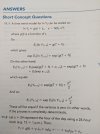Hi again,
I didn't get a reply to my other question yet but I still hope to be enlightened some day!
I'm in the 2021 textbook for quant methods and literally scratching my head out about this one. In Chapter 11 Question1, it's asking what is the relationship between E[ Y(t+h) ] and exp E[ ln( Y(t+h ) ]
Here's a picture of the answer.
I understand most of the steps but I have a problem with the bit where it says "On the other hand" and proceeds to describe the expected value of exp(A+B) as exp(A) plus the expected value of exp(b).
I get that one of these terms is a constant and therefore you can get rid of the expected value operator.
But since when does exp(A+B) = exp(A) plus exp(B)?!
Where I come from, exp(A+B) = exp(A) * exp(B)!!
Please help!!
I didn't get a reply to my other question yet but I still hope to be enlightened some day!
I'm in the 2021 textbook for quant methods and literally scratching my head out about this one. In Chapter 11 Question1, it's asking what is the relationship between E[ Y(t+h) ] and exp E[ ln( Y(t+h ) ]
Here's a picture of the answer.
I understand most of the steps but I have a problem with the bit where it says "On the other hand" and proceeds to describe the expected value of exp(A+B) as exp(A) plus the expected value of exp(b).
I get that one of these terms is a constant and therefore you can get rid of the expected value operator.
But since when does exp(A+B) = exp(A) plus exp(B)?!
Where I come from, exp(A+B) = exp(A) * exp(B)!!
Please help!!

